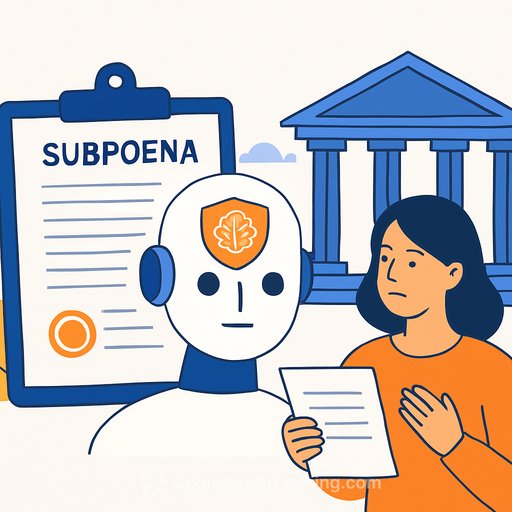Encode accuses OpenAI of intimidation tied to California's AI safety bill
A small nonprofit, Encode, says OpenAI used intimidation tactics to blunt the California Transparency in Frontier Artificial Intelligence Act (SB 53). Nathan Calvin, Encode's legal counsel, posted that OpenAI served him with a subpoena demanding private communications related to the bill. He framed the move as an attempt to chill advocacy while the legislation was advancing and after Gov. Newsom signed it.
OpenAI's chief strategy officer, Jason Kwon, publicly dismissed the allegation and questioned whether the post was financed by Elon Musk. Calvin said Encode has never received funding from Musk and has no connection to him.
What Encode says happened
Calvin shared a subpoena he says was served at his home, seeking texts and emails with California legislators, students, and former OpenAI employees regarding SB 53. He argues OpenAI relied on its separate lawsuit against Elon Musk to justify third-party discovery that targeted a vocal critic and policy advocate.
Encode objected to the subpoena and did not produce the requested communications. Calvin also cited a magistrate judge's broader admonishment of OpenAI's discovery conduct in its case against Musk. Separately, he claimed OpenAI sent a letter to Gov. Newsom seeking carve-outs for firms doing evaluation work with the federal government, which he viewed as an effort to weaken the bill.
How OpenAI insiders reacted
OpenAI's head of mission alignment, Joshua Achiam, called the situation "not great" in a personal post. He urged that engagement on AI policy should build public trust, not erode it, and praised whistleblower protections in principle. Achiam referenced prior internal lessons from the nondisparagement dispute, warning that power can drift without internal pushback.
Calvin, for his part, emphasized he values OpenAI's research and products but believes the company crossed a line by subpoenaing a small nonprofit during a live policy fight. He questioned whether these actions align with OpenAI's stated mission.
Key legal issues for counsel
- Relevance and proportionality in third-party discovery: Under FRCP 45, subpoenas must avoid undue burden; broad demands for private communications tied to legislative advocacy invite scrutiny.
- Associational and petitioning rights: Compelled disclosure of advocacy communications can raise First Amendment concerns and Noerr-Pennington issues, especially for small advocacy groups.
- Legislative and deliberative concerns: Requests touching communications with state legislators may trigger privilege, confidentiality, or comity arguments, depending on context and content.
- Protective orders and motions to quash: If relevance is tenuous, courts may limit scope, shift costs, or quash. Timing during active policy debates can bolster arguments about chilling effects.
- Anti-SLAPP exposure in California: Aggressive litigation tactics that target public participation can face special motions to strike and fee exposure under CCP § 425.16.
- Whistleblower protection provisions: If SB 53 strengthens whistleblower protections at large AI firms, perceived retaliation risks compound legal and reputational exposure.
Practical steps for nonprofits served with third-party subpoenas
- Retain counsel immediately; issue a hold notice; document service and deadlines.
- Meet and confer to clarify scope, custodians, and formats; propose staged or metadata-only productions where feasible.
- Serve timely written objections (relevance, burden, privilege, associational rights) and pursue a motion to quash or for a protective order if needed.
- Assert First Amendment associational privilege with evidence of burden and chilling risk; seek in camera review for any borderline material.
- Request cost shifting; keep a detailed burden log to support proportionality arguments.
- Coordinate a communications plan that does not waive privilege or appear retaliatory; avoid spoliation at all costs.
Guidance for companies engaging on AI policy
- Separate litigation strategy from public policy advocacy; avoid subpoenas that can be seen as targeting critics or grassroots advocates.
- Adopt disclosures and engagement standards for legislative outreach; document good-faith, content-based input on bill language.
- Use narrow, necessity-driven discovery with clear relevance; prefer nonparty stipulations or targeted declarations over sweeping requests.
- Maintain internal escalation paths so counsel and policy leads can veto tactics that risk chilling speech or inviting anti-SLAPP claims.
Why this matters for legal teams
AI legislation is moving fast, and companies are litigating in parallel. That mix can blur lines between valid discovery and pressure tactics that trigger constitutional, statutory, and reputational risk.
Counsel should tighten controls on third-party discovery, stress-test privilege and First Amendment issues, and ensure advocacy efforts build credibility. The court of public opinion can be less forgiving than the courtroom; both must be managed with discipline.
Your membership also unlocks:






